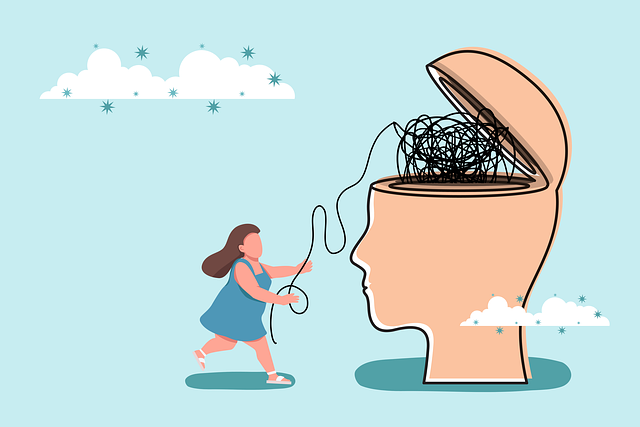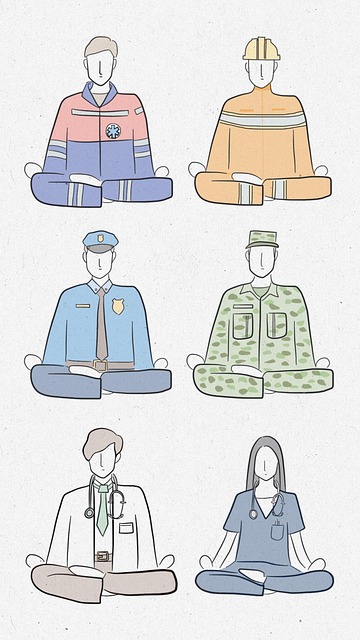Dissociative Disorder (DD), characterized by disconnection from reality, remains stigmatized despite its recognition in diagnostic manuals. Accurate education about DD's causes, symptoms, and treatment options, including therapy for adults with dissociative disorder, is crucial to reduce stigma and encourage access to social skills training and emotional healing processes. Positive media representation, advocacy, and mental health policy are essential to foster understanding, break stigma, and empower individuals seeking therapy for adults with DD. Therapeutic interventions like psychotherapy and CBT, combined with Mental Health Education Programs, enable patients to process trauma, develop coping strategies, and improve quality of life. Accurate media portrayals can inspire support and encourage individuals to seek necessary therapy for adults dissociative disorder.
Mental illness representation in media has a profound impact on societal perceptions and support systems. This article explores the challenges posed by dissociative disorder, a complex mental health condition often misunderstood. We begin by debunking myths and promoting awareness about this disorder. A critical analysis of current media portrayal highlights the need for accurate representation. Subsequently, we discuss therapeutic interventions tailored for adults with dissociative disorder, emphasizing the importance of specialized therapy for adults with dissociative disorder. Finally, we present strategies to foster positive change through accurate media depiction and community engagement.
- Understanding Dissociative Disorder: Debunking Stigmata and Promoting Awareness
- The Current State of Media Representation: A Critical Analysis
- Therapeutic Interventions for Adults with Dissociative Disorder
- Empowering Change: Strategies for Accurate Media Portrayal and Supportive Community Engagement
Understanding Dissociative Disorder: Debunking Stigmata and Promoting Awareness

Dissociative Disorder (DD) is a complex mental health condition that often goes misunderstood. It’s characterized by a disconnection from reality and can manifest in various ways, such as memory lapses, altered perceptions, or even multiple identities. Despite its legitimacy as a recognized diagnostic category in both the DSM-5 and ICD-11, DD still faces significant stigma. This stigma can make it challenging for those affected to seek necessary therapy for adults with dissociative disorder and access appropriate trauma support services.
Promoting awareness about DD involves educating the public about its causes, symptoms, and treatment options. Debunking myths associated with the disorder is crucial in fostering empathy and reducing stigma. For instance, it’s essential to clarify that DD is not a sign of poor memory or willpower but rather a coping mechanism developed by individuals who have experienced severe trauma. By providing accurate information, we can encourage those struggling with DD to access social skills training and emotional healing processes that offer effective support and promote recovery.
The Current State of Media Representation: A Critical Analysis

The current state of media representation regarding mental illness often falls short of reflecting the nuanced reality of lived experiences. Stigmatizing stereotypes are prevalent, particularly in portrayal of severe disorders like Dissociative Disorder, where fictional narratives frequently depict individuals as dangerous or unpredictable. This perpetuates harmful misconceptions and contributes to social exclusion.
A thorough mental health policy analysis and advocacy is necessary to drive positive change. By promoting accurate and empathetic storytelling, we can foster a better understanding among the general public. Encouraging healthcare provider cultural competency training is also crucial, ensuring professionals are equipped to offer effective support. Additionally, incorporating coping skills development in media narratives can empower viewers while offering valuable insights into managing mental health challenges.
Therapeutic Interventions for Adults with Dissociative Disorder

Therapeutic interventions play a pivotal role in managing and treating adults with Dissociative Disorder (DD). One of the primary approaches is psychotherapy, specifically designed to help individuals process and integrate traumatic experiences that often underlie their condition. Techniques such as cognitive behavioural therapy (CBT) have proven effective in addressing associated symptoms like anxiety relief and depression. CBT aids patients in identifying and changing negative thought patterns and behaviours, promoting a healthier sense of self.
Complementing psychotherapy, Mental Health Education Programs Design can empower individuals with DD to better understand their condition. These programs often include components of mental health awareness, teaching coping strategies and resilience-building techniques. By combining therapy with education, adults with DD can gain valuable insights into their experiences, develop effective management skills, and improve overall quality of life.
Empowering Change: Strategies for Accurate Media Portrayal and Supportive Community Engagement

Media representation plays a pivotal role in shaping public understanding and attitudes towards mental illness. To foster positive change, it’s crucial to advocate for accurate and nuanced portrayals that reflect the diverse experiences of individuals living with conditions like Dissociative Disorder. Empowering this process involves several strategies.
Firstly, coping skills development can be integrated into media narratives, offering viewers relatable models for managing challenges. Empathy building strategies, such as sharing personal stories or featuring diverse characters, contribute to breaking down stigma. Furthermore, healthcare provider cultural competency training is essential to ensure professionals portrayed on screen exhibit understanding and sensitivity towards various mental health concerns. By implementing these approaches, media can not only challenge stereotypes but also inspire support and encourage those struggling to seek therapy for adults dissociative disorder and other forms of professional help.
Mental illness representation in media plays a pivotal role in shaping public perception. By critically analyzing current trends and empowering positive change through accurate portrayal, we can foster supportive community engagement. Strategies highlighted, including therapeutic interventions for adults with dissociative disorder, offer hope and guidance. Ultimately, understanding and promoting awareness are key to challenging stigmas and creating a more inclusive society where individuals with mental health challenges are empowered to heal and thrive.









